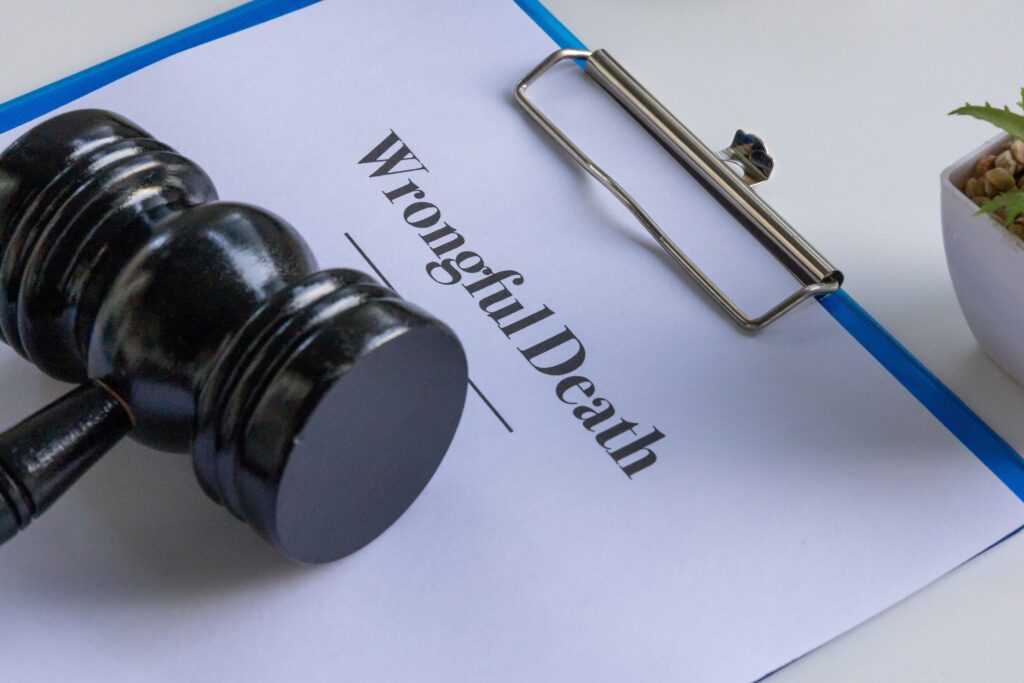Losing someone you depend on financially because of someone else’s mistake, often in a devastating motor vehicle accident involving injuries like brain or spinal cord damage, is incredibly difficult. The grief is immense, but practical worries quickly surface. How do you pay the bills? How do you replace the income that kept your family afloat? It feels overwhelming, maybe even impossible.
But under specific Alberta legislation, you can seek compensation for the loss of income and financial support when someone else’s negligence caused a family member’s death. A trusted Calgary wrongful death lawyer can guide you through the legal process and help you pursue the justice your family deserves. If you’re facing this nightmare, call MNH Injury Lawyers at (888) 664-5298.
GET YOUR FREE CONSULTATION NOW!
Sorting Out “Wrongful Death” in Alberta

The immediate aftermath of a fatal accident leaves families reeling. Amidst the emotional chaos, legal terms start getting thrown around. You need clarity. In Alberta, when a death results from someone’s “wrongful act, neglect, or default,” the legal path for dependents seeking compensation falls primarily under the Fatal Accidents Act.
Think of it this way: if the person hadn’t died from their injuries (perhaps a severe brain injury or spinal cord damage from a car crash) but instead survived, they would have been able to sue the person responsible for their own losses (lost wages, medical costs beyond what Alberta Health Services covers, pain and suffering, etc.). Because they sadly did not survive, the Fatal Accidents Act allows certain family members to step in and make a claim for the losses they now face because of the death.
Who Can Make a Claim Under the Fatal Accidents Act?
This isn’t open to just anyone. The Act specifies who qualifies as a potential claimant, generally those who had a relationship of dependency or close familial ties with the deceased.This typically includes:
- Spouse or Adult Interdependent Partner (unless living separate and apart at the time of death for certain damages)
- Children (biological or adopted, not usually step-children or grandchildren for bereavement damages, but potentially for dependency)
- Parents (including step-parents and grandparents)
- Siblings
The claim itself is usually initiated by the executor or administrator of the deceased person’s estate, acting for the benefit of these eligible family members. If there’s no executor, or if they don’t start an action within a year, eligible family members might be able to bring the action directly. It’s important to know that only one lawsuit can be brought for a wrongful death, encompassing the claims of all eligible beneficiaries.
The Fatal Accidents Act and Your Lost Financial Support
The core purpose of a wrongful death claim under the Fatal Accidents Act isn’t punishment; it’s compensation. It aims to put the dependent family members back in the financial position they likely would have been in had the death not occurred. A major part of this is addressing the lost income – what lawyers and courts often call “loss of dependency.”
This acknowledges the stark reality that the deceased person’s earnings are gone, leaving a gap in the family’s financial resources. The Act allows eligible dependents to claim compensation for this lost financial support they reasonably expected to receive from the deceased had they lived.
This concept of ‘dependency’ is key. It refers to the reliance family members had on the deceased for financial stability and support. This is usually most straightforward for a surviving spouse and minor children who relied on the deceased’s income for housing, food, clothing, education, and other necessities. However, dependency might also apply to aging parents who were being supported by their child, or other situations where a clear financial reliance existed.
Untangling the Math: How Lost Income (Dependency) is Calculated
Figuring out the value of future lost income isn’t as simple as just multiplying the deceased’s last salary by the number of years they might have worked. It’s a complex process aimed at realistically projecting the financial support the dependents have lost. Courts in Alberta rely heavily on evidence, including reports from economists, to arrive at a figure. Here’s a glimpse into the factors involved:
- Deceased’s Earning Capacity: What was the deceased likely to earn over their remaining working life? This looks at their current income, education, work history, skills, and potential for promotions or career advancement.
- Expected Working Lifespan: How many more years would the deceased likely have worked before retiring? Standard retirement ages are considered, but individual circumstances might adjust this.
- Personal Consumption: How much of their income would the deceased have spent on themselves? This amount is deducted because it wouldn’t have been available to support dependents. Economists use statistical data and evidence about the deceased’s spending habits.
- Contingencies: Life isn’t perfectly predictable. Calculations must account for possibilities, both positive (like promotions) and negative (like potential periods of unemployment, illness, or disability affecting income). The possibility of remarriage for a surviving spouse might also be considered, although this is a sensitive and complex factor.
- Level of Dependency: How much did each dependent rely on the deceased’s income? This can vary. For example, a child’s dependency might decrease after reaching adulthood, unless continued support for education was expected.
- Present Value Calculation: Receiving a lump sum today for money that would have been earned over many years in the future isn’t a dollar-for-dollar equation. The total future loss is discounted to its “present value” to account for factors like inflation and the potential for the lump sum to earn investment income over time.
As you can see, this involves detailed analysis and projections. It requires thorough documentation and often expert testimony to establish a fair value for the lost financial dependency.
Beyond Lost Income: What Else Can Be Claimed?

While replacing lost income is often the largest financial component of a wrongful death claim, the Fatal Accidents Act recognizes other significant losses that dependents suffer. Compensation may also be available for:
- Bereavement (Loss of Guidance, Care, and Companionship): The law acknowledges the profound emotional loss. The Act sets specific, fixed amounts payable to certain close family members for their grief and the loss of the deceased’s companionship and care.
- Note: Spouses or partners living separately at the time of death are typically not eligible for this specific bereavement amount. Siblings are also not eligible for this fixed bereavement payment under the Act.
- Loss of Housekeeping and Childcare Services: If the deceased contributed significantly to household chores, maintenance, childcare, or other home-related services, dependents can claim the value of replacing those lost services. This can be substantial, especially if the deceased was a primary homemaker. Calculations often involve estimating the hours spent on tasks and the cost of hiring someone to perform them.
- Funeral and Burial Expenses: Reasonable costs associated with the funeral, burial, or cremation, including a monument or headstone, are typically recoverable.
- Expenses Before Death: Costs incurred for the care of the deceased between the time of the injury (e.g., from the car accident) and their death can be claimed. This might include travel and accommodation for family visiting during that time.
- Grief Counselling: Fees paid for grief counselling for eligible family members are also recoverable.
It’s important to remember that these damages are pursued through the lawsuit against the at-fault party.
What About Insurance? Section B Benefits Explained
In Alberta, every standard auto insurance policy includes “Section B” or Accident Benefits. These are crucial because they provide some immediate support regardless of who was at fault for the motor vehicle accident. If your loved one died in a car crash, Section B benefits from the vehicle they were in (or the vehicle that struck them if they were a pedestrian) offer specific death benefits.
Based on the standard policy and recent information (always verify the current policy limits):
- Death Benefit: A lump sum payment is available. The amount depends on the deceased’s age and status within the household (e.g., head of household, spouse, dependent). Recent figures suggest a principal sum up to around $10,000, but this varies based on specifics outlined in the policy.
- Funeral Expenses: Section B provides a contribution towards funeral costs This helps cover immediate expenses.
- Grief Counselling: A small amount is allocated per family or household member for grief counselling, recently noted as around $500 per member (or $400 per family in older references).
Key things to know about Section B:
- No-Fault: You can access these benefits even if the deceased was deemed partially or fully at fault for the accident.
- Separate from Lawsuit: These benefits come from the relevant auto insurance policy (usually the one covering the vehicle the deceased was in) and are separate from the Fatal Accidents Act claim against the negligent party’s insurance.
- Interaction: While separate, there can be interactions. For instance, the funeral expenses paid under Section B might be deducted from the total funeral costs claimed in the main lawsuit, preventing double recovery. The Fatal Accidents Act states that damages awarded in the lawsuit are generally not reduced by other insurance proceeds (like life insurance), but specific interactions with Section B should be clarified.
Accessing Section B benefits is usually more straightforward than the main lawsuit and doesn’t typically require a lawyer initially, though guidance can be helpful.
Building Your Case: The Importance of Evidence
Making a successful claim for loss of income requires proving both the negligence that caused the death and the financial dependency that existed. This means gathering substantial evidence.
You’ll need documents that demonstrate:
- The Deceased’s Income and Potential:
- Income tax returns (Notice of Assessments)
- Pay stubs and T4 slips
- Employment contracts or letters confirming salary and benefits
- Business financial records (if self-employed)
- Educational records and professional qualifications
- The Dependency Relationship:
- Proof of relationship (marriage certificate, birth certificates)
- Shared bills, bank accounts, or mortgage statements demonstrating financial interdependence
- Evidence of financial support provided (e.g., cancelled cheques, e-transfers)
- Other Expenses:
- Receipts for funeral and burial costs
- Receipts for grief counselling
- Receipts for any expenses incurred caring for the deceased between injury and death
- Medical reports related to the fatal injuries (linking the accident/negligence to the death)
Expert reports, particularly from economists (for income loss/dependency) and sometimes vocational experts or accountants, are also fundamental in calculating and substantiating the financial losses claimed under the Fatal Accidents Act.
Why Navigating This Alone is Tough

Reading this, you can see that pursuing compensation for lost income after a wrongful death is legally and procedurally complex. Calculating dependency losses involves specific methodologies and expert input. Dealing with insurance adjusters representing the at-fault party requires careful negotiation; their goal is to minimize payouts. Proving negligence, gathering evidence, understanding the nuances of the Fatal Accidents Act and Section B benefits, and managing the legal process while grieving is incredibly difficult.
A lawyer experienced in Alberta fatal accident claims handles these burdens. They work to gather the necessary evidence, engage the right experts, build the strongest case possible for your financial losses, and represent your family’s interests throughout the process, whether negotiating a settlement or proceeding through the courts.
Secure the Support Your Family Needs
Don’t try to manage this complex process alone during such a painful time. A compassionate and experienced Calgary personal injury lawyer can help shoulder the legal burden and fight for the justice you deserve.
Call MNH Injury Lawyers today at (888) 664-5298 for a direct conversation about your situation and how we can assist you.
